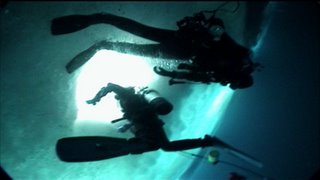
Wild Blue Yonder (2005)
Starring: Brad Dourif
Written and Directed by: Werner Herzog
Official Website
Photo: Henry Kaiser, via wernerherzog.com
When I went to see Wild Blue Yonder, I had no idea what to expect. The film is Werner Herzog's latest documentary (sort of), riding in on the coattails of his brilliant art house hit Grizzly Man. It was it's status on IMDB as a "documentary/sci-fi" that drew me to it, and Herzog's gorgeous, haunting little film did not disappoint.
The tale is a familiar one: an alien (Brad Dourif, Deadwood) tells the story of a faraway planet which for unknown reasons began to die, and of its inhabitants that came to Earth in search of a new home. In the aftermath of their coming, the government sends a crew of astronauts to journey into the expanse of space to find their own new world.
The story is told almost completely through gathered footage of the astronauts of space shuttle STS-43, and Henry Kaiser's video of Antarctica. Original footage includes Dourif narrating the story, and a few mathematicians theorizing on the nature of space travel. This documentary footage juxtaposed with the fantastical "plot" is woven seamlessly together by Herzog. By the end of the film, I had forgotten which was documentary, and which was sci-fi.
Dourif's performance as the tortured alien is simultaneously painful and hilarious. He wanders around an abandoned desert city and pontificates in the midst of a destroyed trailer, practically swimming in a sense of loss and regret. At one point, he tells the audience why their utopia on Earth failed. "We were sent by wonderful scientists," he said. "But we just sucked." It's a humorous moment, but it's tinged with the feeling all in a modern age feel: the failure to live up to the expectations of our predecessors.
It is not a perfect film. At a few points the footage of the shuttle seems to drag on (compelling as it is, how long do we really have to watch people turn in the air and eat astronaut food?) And the music, an array of cello, Senegalese singing, and a five-man Sardinian shepherd choir, is intriguing at first but quickly becomes distracting and a little shrill.
The film is about the history of man's flight, and of the constant search for the next frontier, for the next place to see, settle on, and make money off of. It is also a not-so-subtle commentary on our treatment of our own planet. But in the end it highlights precisely what Grizzly Man highlighted: nature's refusal to be tamed or civilized, as something to be viewed with reverence and fear. The space shuttle's views of Earth from space, Kaiser's footage of the frozen waters of Antarctica, the failed city in the middle of a desert- all show how a place we call home can still look completely alien. That is Herzog's genius.
Grade: A-

No comments:
Post a Comment